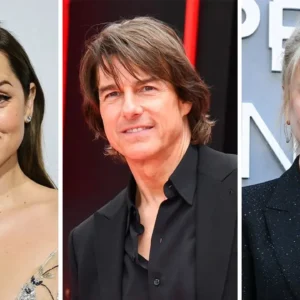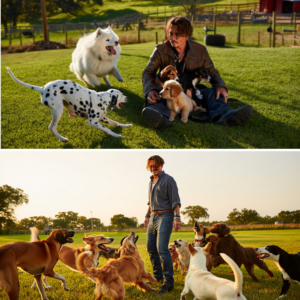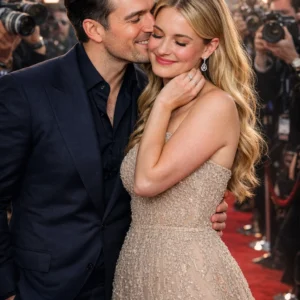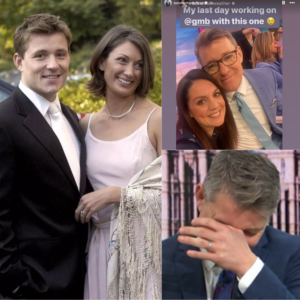Jodie Foster, the two-time Academy Award-winning actress and filmmaker whose six-decade career has made her a Hollywood icon, is often seen as the epitome of success. From her breakout role as a teenage prostitute in Taxi Driver (1976) at age 13 to her recent Golden Globe win in January 2025 for True Detective: Night Country, Foster has consistently delivered performances that resonate with audiences and critics alike. Yet, beneath her polished exterior and impressive resume lies a surprising vulnerability: even Jodie Foster, a woman who has achieved more than most could dream of, sometimes feels like a failure. This revelation, shared in various interviews over the years, offers a rare glimpse into the mind of a Hollywood legend and underscores the universal struggle of self-doubt, even among the most accomplished.
Foster’s feelings of failure have been a recurring theme throughout her life, a struggle that began early in her career and persisted despite her accolades. Born on November 19, 1962, in Los Angeles, Foster started acting at the age of three, appearing in a Coppertone television commercial. Raised by her mother, Brandy Foster, in a single-parent household, she became the family’s breadwinner, supporting her siblings through roles in Disney films like Freaky Friday (1976) and over 50 television shows. Yet, this early success came with immense pressure. In a 2018 interview at Yale University, where she received the Yale Undergraduates’ Lifetime Achievement Award, Foster admitted to feeling like an impostor among her peers at Yale, where she studied literature in the early 1980s. “I felt like everybody else was smarter than me. I had to pretend that I knew what I was talking about,” she said, reflecting on her college years. This sense of inadequacy, often referred to as impostor syndrome, followed her even as she achieved critical acclaim.
One of the most striking examples of Foster’s self-doubt came during the production of The Accused (1988), a film that would ultimately earn her first Oscar for Best Actress. In the movie, Foster plays Sarah Tobias, a young woman who is gang-raped at a bar, delivering a raw and powerful performance that showcased her dramatic depth. However, Foster was deeply unhappy with her work during filming. In a 2021 interview on the WTF podcast with Marc Maron, she revealed, “I felt like a little bit of a failure when I made The Accused, because there were things that the producer and director were trying to encourage me to do differently, and I couldn’t.” She internalized the producers’ concerns that her character might be offensive or unlikable, leading her to question her abilities. “I felt like a bad actor because I couldn’t make that character more likable for them,” she added. Even after the film’s release, when she saw a rough cut, Foster was convinced it was “terrible” and that her performance was “awful.” She prepared to pivot to graduate school, believing her acting career was over—only to win an Oscar for the role, a moment she later described with a mix of humor and disbelief at Yale in 2018.
This pattern of self-criticism continued into Foster’s later years. In a 2016 interview with The New York Times ahead of the release of her directorial project Money Monster, Foster spoke candidly about her fear of failure, a theme that resonates deeply in her work. “Failure is a big one for me—people in spiritual crisis, in a moment in life of total self-hatred,” she said, explaining how the film, which explores the desperation of a man who takes a TV host hostage after losing everything, mirrored her own insecurities. Foster admitted to being propelled by a sense of inadequacy, saying, “If Mother Teresa is propelled to do good works because she believes in God, I am propelled to do good works because of how bad I feel about myself. It’s the first place I go: ‘Oh, what did I do wrong?’” This raw honesty reveals a side of Foster that contrasts sharply with her public image as a confident, accomplished star—a duality that makes her struggles all the more relatable.
Foster’s feelings of failure were particularly acute during her 50s, a decade she described as challenging in a 2023 interview with Elle. “Fifty through 60 is kind of tough, still holding on to and competing with your past self,” she said. During this period, while raising her two sons, Kit and Charlie, and focusing on directing projects like The Beaver (2011), Foster stepped back from acting, feeling the pressure of Hollywood expectations. “I was still being asked to open on 3,000 screens, and I didn’t really want the pressure of that,” she explained. She also grappled with unmet personal goals, admitting, “I went through a period where I was like, ‘Wow, I had these goals about writing and directing, and I didn’t meet any of them.’ And I couldn’t stop feeling like a terrible failure—like I hadn’t lived up to all the lofty expectations that I had for myself.” This reflection highlights the immense pressure Foster placed on herself, even as she continued to achieve milestones, such as directing episodes of Orange Is the New Black and Black Mirror.
Foster’s struggles with impostor syndrome have been a lifelong battle, as she revealed in a 2025 article on thecreativemind.net. “I always feel like something of an impostor. I don’t know what I’m doing,” she has said, a sentiment she echoed in earlier interviews, such as a 1995 CBS appearance where she admitted to feeling like a fraud even before her Oscar win for The Accused. “I felt like an impostor, faking it, that someday they’d find out I didn’t know what I was doing. I didn’t. I still don’t,” she confessed. This persistent self-doubt, often characterized by anxiety about achievement and a fear of being exposed as a fraud, is a common experience among high-achievers, particularly women, as noted in the Women’s Studies Encyclopedia. For Foster, this feeling was compounded by her early start in Hollywood, where she was thrust into the spotlight at an age when most children are still learning to read.
Despite these struggles, Foster has found ways to reframe her perceived failures as a source of growth. At a Radcliffe Day event at Harvard in May 2025, where she received the 2025 Radcliffe Medal, Foster spoke about her evolution from a 1970s Disney child star to a celebrated filmmaker, acknowledging the “painful” lessons she learned along the way. “I think that if you don’t have that feeling of being insignificant and wanting to be significant, you must not be significant,” she told the audience, suggesting that her insecurities have fueled her drive to succeed. This perspective has allowed her to find value in her journey, even as she continues to grapple with self-doubt.
Foster’s vulnerability has also made her a mentor to younger actors, particularly women, whom she feels protective of. In her 2023 Elle interview, she shared how she often reaches out to young actresses, offering “maternal advice” to help them navigate the industry’s pressures. “I find myself saying, ‘Wait a minute, you keep doing dumb things on publicity tours. What’s going on with you? This is a little self-sabotage,’” she said, reflecting her desire to shield others from the pitfalls she faced. This protective instinct stems from her own experiences as a child actor, where she relied on her mother’s guidance to survive Hollywood’s often toxic environment—a world she described as having “no women on sets for the first 20 years of my career” in the same interview.
As Foster continues her career in 2025, with projects like her upcoming French psychological drama and a renewed focus on directing, her openness about feeling like a failure offers a powerful lesson. Her recent success with True Detective: Night Country, which earned her critical acclaim and a Golden Globe, has shown that she remains a force in the industry, even as she navigates her insecurities. In a 2024 interview with The Guardian, Foster reflected on her survival, saying, “I think I have managed to survive, and survive intact, and that was no small feat.” Her willingness to share her struggles—whether it’s feeling like a fraud at Yale, doubting her performance in The Accused, or grappling with unmet goals in her 50s—makes her not just a Hollywood legend, but a deeply human one. For fans and aspiring artists alike, Jodie Foster’s story is a reminder that even the most successful among us can feel like failures sometimes—and that it’s in those moments of doubt that we often find the strength to keep going.





